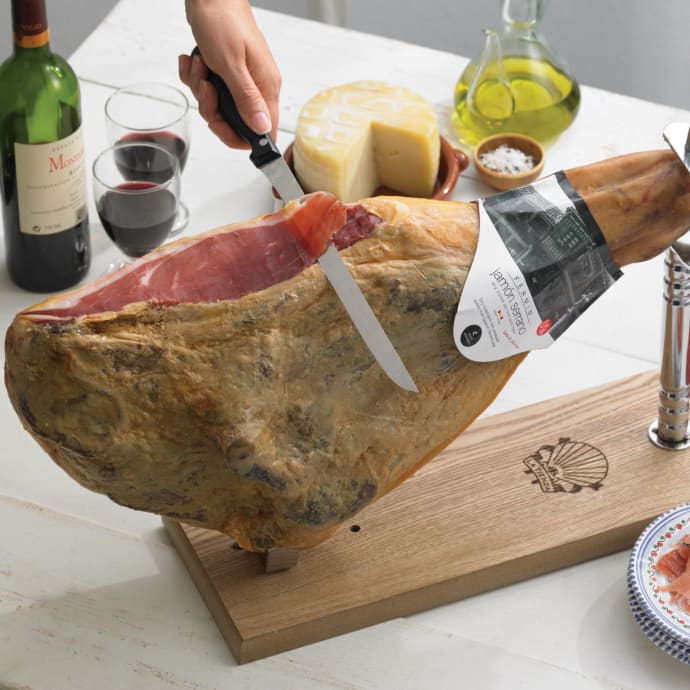Associated Press
There's trouble afoot in the world of high-priced Spanish hams. A black foot to be precise.
Less than a year after the U.S. government finally allowed the import of Spain's succulent and exceedingly expensive jamón Ibérico de bellota, the cured meat long sought by American gourmets has become caught in a quagmire of regulations and trade wars.
The trouble started just months after the hams — traditionally presented with the distinctive black hoof still attached — began arriving. Someone noticed that the hoofs violated a USDA sanitary rule requiring they be removed.
USDA spokeswoman Peggy Riek says the rule, which also applies to domestic production, is designed to reduce the risk of contamination. So officials began making importers cut off the hoofs. It satisfied the regulations, but irritated eaters.
"In all its glory, it won't be the same without the hoof," says Jonathan Harris, co-owner of LaTienda.com, an online retailer of Spanish wine and food, including the bellota ham.
Meanwhile, the ham also is caught in a trade dispute between the United States and Europe that could double its already exorbitant price. As of April 23, dozens of European foods, from mineral water to chickens, could be slapped with steep new taxes.
The tax — which is 100 percent on cured Spanish hams shipped with the bone — is the latest parry in a long-running quarrel with the European Union over its ban on U.S. beef produced with growth hormones.
"You're just hurting individual businesses," says Taylor Griffin, president of The Rogers Collection, a Portland, Maine-based luxury foods importer. "You're not helping American trade in any way."
The high-end ham is made from pampered free-range pigs fattened on acorns in the forests of southwestern Spain.
The acorn diet gives the meat a satiny taste that sets it apart even from other prized Iberico hams.
It can sell for $1,400 for a full ham from thigh to hoof and is described without irony as the Holy Grail of ham.
"It's the best ham in the world. It's the caviar of ham. I'm such a proponent of it," says chef Terrance Brennan of the New York restaurants Picholine and Artisanal. "Once you have it, you can't go back to proscuitto ... For me, it's sublime."
Strict regulations kept the bellota and other Iberico hams out of this country until a Spanish company, Embutidos Fermin, built a slaughterhouse that met muster.
They began importing Iberico hams to the U.S. last year in partnership with Rogers Collection and chef Jose Andres.
The pending arrival of Iberico hams in the United States made headlines. Even then-candidate Barack Obama indulged in a sample during a campaign stop last year in Philadelphia. He called it "delicious."
There is hope for ham lovers. The tariff covers only hams shipped on the bone, so sliced products won't be affected.
And U.S. trade officials already have delayed the tariff from the original date of March 23 to give them time to hash out an "interim solution" with their European counterparts.
The tariff also is being challenged by Nestle Waters North America, a Greenwich, Conn.-based subsidiary of Switzerland-based Nestle SA that sells Pellegrino mineral water.
The company claims in U.S. International Trade Court that U.S. trade officials improperly exceeded their authority with the tariff, in part because the value of the imported goods exceeds the amount allowed by law.
On the hoof issue, Griffin says the governments of Spain and the United States are working to solve it, though the USDA said it has yet to receive an appeal. Meanwhile, Harris says La Tienda will just have to sell bellota ham without the hoof.
He says they still have some of the hoofed ham in stock. But once they're gone, that's all folks.
Read full article...

 SHIPS FREE
SHIPS FREE SHIPS FREE
SHIPS FREE NEW
NEW
 SHIPS FREE
SHIPS FREE SALE
SALE





